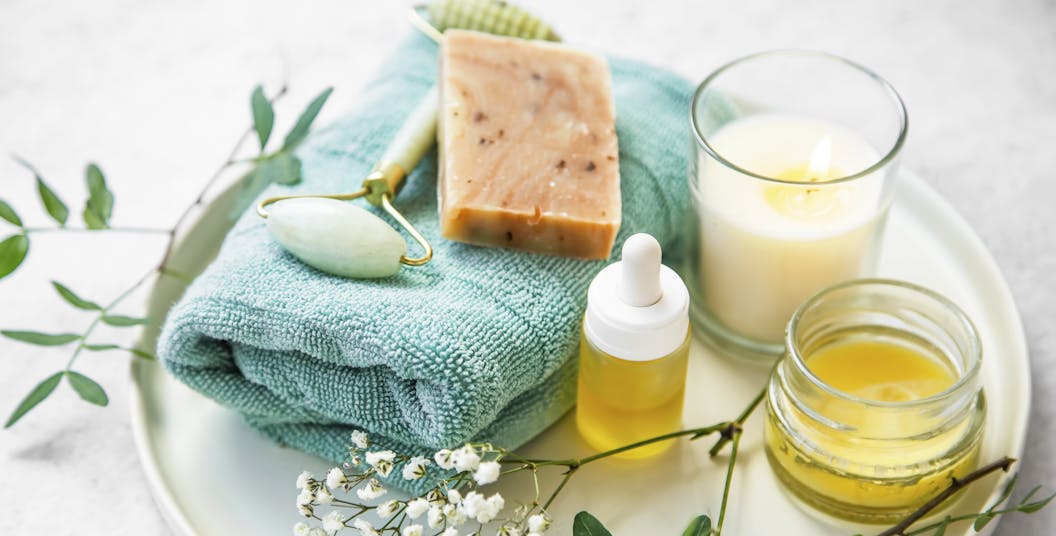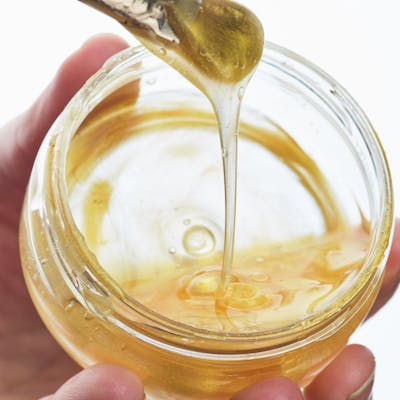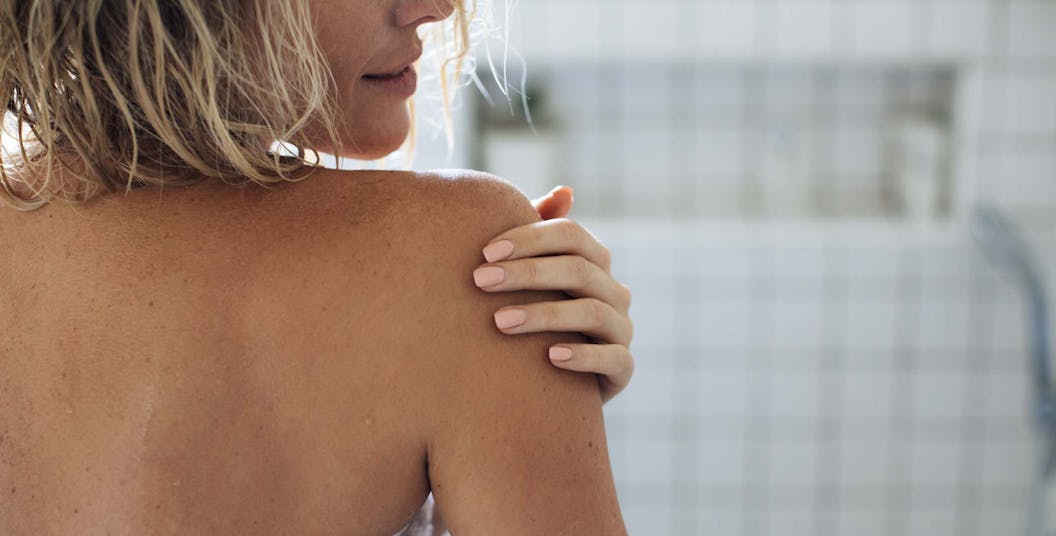
We all want glowing, youthful-looking skin, and many of us will try anything to get it.
The miraculous claims and attractive packaging of conventional skincare products can certainly lure us in. But you may want to think twice when it comes to choosing your skincare range.
Choosing to purchase and use conventional products over natural skincare products may be coming at a cost to your inner health.
Australian women spend a lot on skincare
For the sake of beauty, Australian women spend up to $3,600 each year on looking their best. But as we smear on that moisturiser or scrub ourselves with soap, we usually pay zero attention to what it might be doing to our bodies. Both inside and out.

To put it simply, most conventional skincare products on the market today contain trace amounts of harmful chemicals. Yes, these toxic ingredients are usually present in only very small amounts, but if you’re applying these products day after day, the cumulative effect can be damaging.
Natural skincare products, on the other hand, are often a much safer alternative. And yes - they do work!
To appreciate the power of plant-derived natural skincare products, let’s go on a quick journey. Back to the days when Cleopatra walked the earth.
A brief history of natural skincare
Skincare routines have been part and parcel of human life for thousands of years.
Evidence points to the Ancient Egyptians being one of the first civilisations to develop skincare routines. Divinity and beauty went hand in hand in Ancient Egypt. Therefore, they poured a lot of effort into making powerful products derived purely from nature.
Their beauty routine involved three simple steps.
Cleanse, treat, and moisturise.
A soap paste made from clay and olive oil would commonly be used to clean the skin, while castor, sesame, and moringa oils were applied to fight wrinkles.
Queen Cleopatra had her own skincare ritual that involved bathing in donkey’s milk to promote soft and supple skin.

The next civilisation to become masters of natural skincare was the Ancient Greeks. Olive oil and honey were the main ingredients used in their skincare products. These ingredients are still used today to moisturise and renew the cells.
Other common natural ingredients used as part of the Greek skin routine included rose oils and rose water. Both are excellent at cleansing and hydrating the skin.
The Ancient Greeks would also use handmade products, including a treatment mask concocted from fresh berries and milk.
As the years went on, skincare routines continued to evolve.
In the 1800s, honey, oatmeal, and egg yolks became popular skincare ingredients. Unfortunately, so did some products that were much harsher on the skin.
Lightened skin became a beauty trend during this era and many women resorted to using extremely poisonous arsenic-laced soaps and moisturisers. Shockingly, lead was also used to treat pimples. This would sometimes cost lives.
From the 1900s onwards, commercial skincare products exploded on the market. During the 1940s and 50s, well-known brands such as Estée Lauder and Clinique started to emerge in households.
The Dangers of Conventional Skincare
Today, there are thousands of skincare products available in stores and online.
Although not as toxic as the arsenic soaps of the 1800s, many conventional products today may still be harmful.
Recent studies (1, 2) have shown that many beauty and skincare products may be doing more damage than we think.
Our skin is our body’s biggest organ. Anything we put on it gets absorbed into the bloodstream. Therefore, we should really be paying attention to what we slap on our skin every day.
Many conventional skincare products are loaded with synthetic, man-made ingredients. Some toxic ingredients that commonly appear on skincare labels include:
- Parabens
- Phthalates (some of which have already been banned in Australia)
- Petroleum Jelly
- Formaldehyde
- Oxybenzone (commonly found in sunscreen)
- Synthetic Fragrances
Although chemicals in consumer products are regulated, there is a lack of studies that examine their long-term effects. We think that - as with all toxic elements in our environment - it’s probably best to limit our exposure as much as possible.
Now, chances are, you haven’t heard of many of these ingredients. They’re hard enough to pronounce, so what on earth do they mean?!
Let’s look at one of the most common ingredients in skincare lotions and creams today. Parabens.
The Science on Parabens
Parabens are a group of preservatives that are found in most mass-made skincare and cosmetic products. They are added to prevent the growth of harmful bacteria and mould, known as microbes.
Parabens have been approved for use in Australian beauty products. However, their safety has recently become a little controversial.
Dale Leitman, a professor from UC Berkeley, tells us that parabens may be more harmful than what the regulators think. Although researchers have deemed parabens in beauty products as too weak to cause any harm, Leitman states:
“This might not be true when parabens are combined with other agents that regulate cell growth”.
To simplify what Leitman is saying - parabens seem to work differently inside the body than what they do when studied in isolation.
Parabens, like many other ingredients found in skincare products, are hormone disruptors.
When parabens enter the body, they mimic oestrogen, a female sex hormone.
Think of oestrogen and parabens as twins. They look the same, and act the same, but one is good and the other is, well, not so good.
Both oestrogen and parabens attach to the same site on cells. When this happens, the body is tricked into thinking it has become overloaded with oestrogen.
This is where it gets a little scary. This 'perceived' overload of oestrogen can trigger a reaction. The cells may start to rapidly divide and could cause cancerous tumours. Parabens have, in fact, been found in trace amounts within sampled breast cancer tissue (3).
It’s important to remember that there has been no solid evidence that parabens cause cancer. But we think that when it’s so easy to switch to kinder alternatives, opting for a paraben-free product is potentially the smarter choice.
The Skin’s Microbiota
Your skin is essentially your body’s first layer of defence against the outside world.
Like the gut, the skin hosts a diverse array of beneficial bacteria, known as your microbiota.
The microbiota, like a fingerprint, is unique amongst individuals. Your microbiota is influenced by a combination of genetic and lifestyle factors and plays an important role in keeping you healthy.
Your skin microbiota also helps maintain internal balance by directly interacting with your immune system. When the microbiota is flourishing, the skin appears radiant and healthy.
When we constantly lather on synthetic chemicals found in conventional body washes, creams, and shampoos – we are essentially damaging this rainforest of healthy bacteria. We also weaken the skin barrier.
Weakening the skin barrier makes it easier for toxins to enter the body leading to long term health problems. In addition, irritating the skin by applying harsh ingredients can trigger or worsen conditions such as rosacea, breakouts, eczema and sensitive skin.
Of course, certain ingredients will affect everyone differently.

Why Choose Natural Products?
Natural products are often much safer and softer on the body than conventional products. Natural products often work with your skin’s microbiome, rather than against it.
Beauty and nature have historically been intertwined, and natural ingredients have long stood the test of time.
The concern for many people is that natural products might not be as effective as conventional ones. However, natural skincare and beauty products are often packed with powerful plant-derived antioxidants that help protect the skin and combat ageing.
Another benefit of natural products is that many are also eco-friendly. So, by choosing natural products, not only will you be looking out for yourself and your family, but you’ll be protecting the environment too!
However, we know that choosing the best natural skincare product can be a daunting task. No, not all natural products are created equal.
To clear the confusion and help make your purchasing decision easier - look for products that are paraben-free, synthetic-free, and GMO-free. You should also check for any allergens that you may be susceptible to.
Looking for certification labels can also help.
Products with the ACO (Australian Certified Organic), for example, must be derived from at least 95% organic ingredients.
In the rare case that you have enough time - you could also do a quick google search for any hazardous-sounding ingredients on the label.
To make your life a lot easier, here are a few natural and eco-friendly skincare products that our team here at Cow & Coconut highly recommend!

Australian Pink Clay Face Soap from The Australian Natural Soap Company
A lush combination of only four natural ingredients - Australian pink clay, macadamia oil, Himalayan cedarwood and lemongrass oil.
This natural, handmade soap will leave your face feeling hydrated and soft. It contains zero harmful ingredients and is palm oil-free, cruelty-free and vegan!
And it makes a beautiful gift!

The Jojoja Company's Jojoba Oil
Why not experience the power of nature with Australian Jojoba Oil? Cold-pressed and pure, this oil from The Jojoba Company is rich in vitamins A, D, and E, plus Omega 6 and 9, to moisturise, repair, and restore your skin's natural balance.
Cow & Coconut is committed to providing chemical-free products you love, using only the most nourishing ingredients nature has to offer.
Switch to a kinder alternative.